การบริหารจัดการเงินสนับสนุนจากภาครัฐ เงินบริจาค และทรัพย์สินของวัด (The Management of Government Support, Donations and Property of the Temple)
Main Article Content
บทคัดย่อ
การวิจัยครั้งนี้มีวัตถุประสงค์เพื่อ 1) ศึกษารูปแบบ กระบวนการ การบริหารจัดการเงินสนับสนุน จากภาครัฐ เงินบริจาค และทรัพย์สินของวัด 2) ศึกษาจุดเสี่ยง ปัญหาอุปสรรค กระบวนการการบริหารจัดการเงินสนับสนุนจากภาครัฐ เงินบริจาค และทรัพย์สินของวัด และ 3) ศึกษาแนวทางการการบริหารจัดการเงินสนับสนุนจากภาครัฐ เงินบริจาค และทรัพย์สินของวัด ให้มีความโปร่งใสสามารถสร้างศรัทธา และความเชื่อมั่นในพระพุทธศาสนา โดยใช้วิจัยเชิงคุณภาพแบบพรรณนา เพื่อค้นหาข้อเท็จจริง การดำเนินการวิจัยเลือกพื้นที่แบบเฉพาะเจาะจง คือ วัดแห่งหนึ่งในจังหวัดขอนแก่น ตำบลในเมือง อำเภอเมืองขอนแก่น จังหวัดขอนแก่น สังกัดคณะสงฆ์มหานิกาย และเลือกผู้ให้ข้อมูลหลักแบบเจาะจง แบ่งผู้ให้ข้อมูล ออกเป็น 3 กลุ่มหลัก รวมทั้งหมด 9 รูป/คน ได้แก่ ผู้บริหารของวัด/ผู้เกี่ยวข้องกับวัด, ผู้บริหารของโรงเรียนพระปริยัติธรรม แผนกสามัญศึกษา/ผู้มีส่วนเกี่ยวข้อง และ ผู้บริหารของหน่วยงานที่เกี่ยวข้อง/ผู้มีส่วนเกี่ยวข้อง เครื่องมือที่ใช้ในการวิจัย คือ แบบสัมภาษณ์เชิงลึกแบบมีโครงสร้าง และแบบไม่มีโครงสร้าง
ผลการวิจัย พบว่า 1) รูปแบบ กระบวนการ การบริหารจัดการเงินสนับสนุนจากภาครัฐ เงินบริจาค และทรัพย์สินของวัด วัดบริหารจัดการภายใต้กฎหมาย กฎ ระเบียบ มติมหาเถรสมาคม กฎกระทรวง และตามหลักพระธรรมวินัย โดยเจ้าอาวาสดำเนินการแต่งตั้งคณะทำงานและไวยาวัจกรช่วยในการดำเนินงานวัด 2) จุดเสี่ยง ปัญหาอุปสรรค ของวัดยังไม่มีรายงานทางการเงินที่เป็นไปตามหลักการของการจัดทำบัญชี การเปิดเผยข้อมูลทางการเงินของวัดยังอยู่ในวงจำกัด ส่วนมากวัดจะจัดทำรายงานทางการเงินและเก็บไว้เองที่วัด มิได้มีการเผยแพร่ให้สาธารณชนได้รับทราบวัดขาดการวางแผนระบบการบริหารจัดการทรัพย์สินของวัดเพื่อประโยชน์อย่างมีประสิทธิภาพขาดกลไกลในการกำกับดูแลที่จะให้มีการบริหารเงินที่สอดคล้องกับ หลักการบริหารจัดการ 3) แนวทางการบริหารจัดของวัดที่จะสามารถสร้างศรัทธา และความเชื่อมั่นในพระพุทธศาสนา วัดควรยึดหลักการบริหารกิจการที่ดีในการบริหารจัดการยึดหลัดความโปร่งใสเป็นสำคัญ มุ่งเน้นการบริหารแบบมีส่วนร่วม ยึดการบริหารตามกรอบ การพัฒนาทั้ง 6 ด้าน ประกอบด้วยการปกครอง การศาสนศึกษา การเผยแผ่ การสาธารณูปการ การศึกษาสงเคราะห์ และการสาธารณสงเคราะห์ ปฏิบัติตามมติ กฎมหาเถรสมาคมที่กำหนด การบริหารงบประมาณวัดใช้แนวทางหลักความพอเพียง มุ่งเน้นประโยชน์ให้กับส่วนรวมมากกว่าแก่บุคคลใดบุคคลหนึ่ง
The objectives of this research were to: 1) study model, process and management of government support, donations and property of the temple; 2) study risks and obstacles of management of government support, donations and property of the temple; and 3)study management guidelines for government support, donations and property of the temple to strengthen transparency and faith and trust in Buddhism. This research was a descriptive research to find facts. The research selected specific area which was a temple in Khon Kaen, Nai Muang, Muang Khon Kaen, Khon Kaen province under Maha Nikaya. The key informants were divided into three main groups totaling 9 persons: temple managements/ stakeholders, managements of the General Education Section of PhraPariyattidhamma School/ stakeholders and managements of relevant organizations/ stakeholders. And, the research tools included structured and unstructured in-depth interviews.
The findings revealed that: 1) Model, process and management of government support, donations and property of the temple. The temple managed under laws, regulations and rules of the Sangha Supreme Council of Thailand, ministerial regulations and Buddhism disciplines as the abbot designated management committee and for temple management; 2) Risks and obstacles of management of government support, donations and property of the temple. The temple did not conduct financial statements under generally accepted accounting principles (GAAP). The financial data disclosure was limited. The temple mostly conducted the financial statements and kept in the temple so it was not disseminated to public. Moreover, the temple did not have efficient properties management plan as well as did not have supervision mechanics for controlling financial management in line with management principles; and 3) Management guidelines for government support, donations and property of the temple to strengthen transparency and faith and trust in Buddhism. The temple should uphold good governance, transparency, participating management, management under six aspects of development framework including administration, religious education, public facilities, educational welfare and public welfare, comply with resolutions of the Sangha Supreme Council of Thailand. The budget management implemented sufficiency and mainly focused on public benefits rather than individuals.

